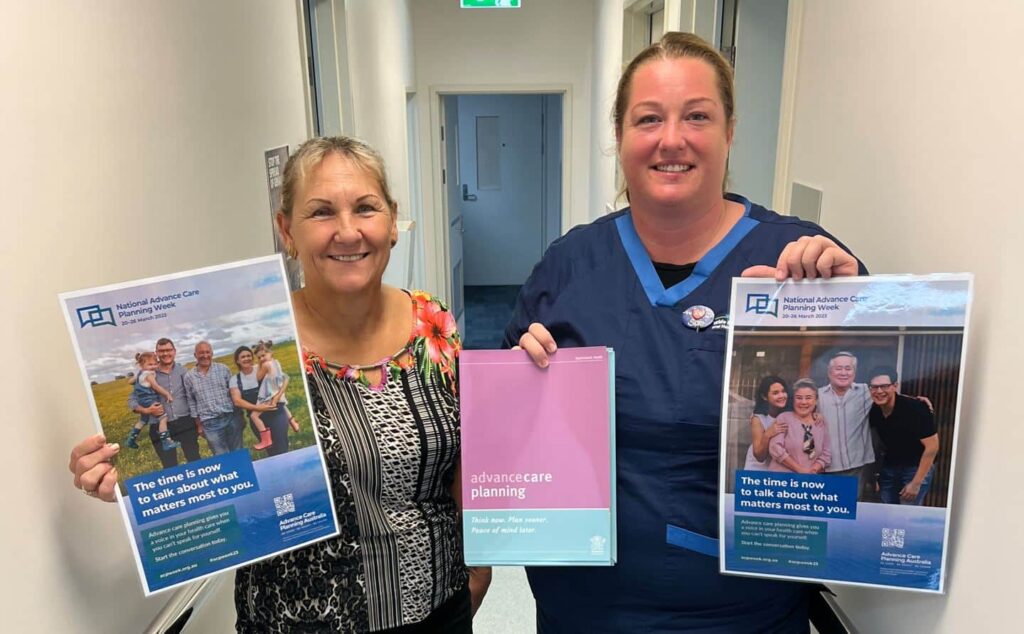
Sisters Gayle Dilger and Kathy Tobin are encouraging residents to make an Advance Care Plan as part of National Advance Care Planning Week at Bundaberg Hospital.
The duo said the final steps of their uncle’s life highlighted the importance of families knowing the wishes of their loved ones and having clear directions set out by an Advance Care Plan.
It’s an important message, as during National Advance Care Planning Week data has revealed only 15% of Australians and 8, 301 Wide Bay residents have provided these directions.
“Our uncle had different belief systems to a lot of people, which he had shared with his family. His family knew that he had lived his life and he was waiting to die,” Gayle said.
“He was old, and he could no longer be independent. So it was very important to him that he wasn’t a burden on anyone and the family knew what he wanted.”
Their uncle had made his wishes known to his family and provided his doctor with information for an
advance care directive.
However, when he became unwell it became clear that there were gaps in this information as he entered aged care.
“We already knew his wishes and he was 86, so it wasn’t overly confronting. However, what became confronting was when he became unwell, and actually knowing the depth that you need to have thought about and discussed with your family,” Gayle said.
Wide Bay Hospital and Health Service clinical nurse and Advance Care Planning spokesperson Samantha Matthews said that the advance care directive ensured that all the different health and age d care services knew exactly what the patient’s wishes were.
“Having the advanced care plan enabled the nursing home to call our team instead of an ambulance . It enabled us to go out and treat him at the facility rather than treat him in the ED,” Samantha said.
For Gayle and Kathy’s uncle , the care team involved was WBHHS’s Residential Aged care facility Support Service which provide s acute care to patients at aged care facilities .
This service means patients can avoid unnecessary trips to the emergency department.
“He was in a familiar environment, in his own room where he wanted to be, not on a shared ward or in ED. We could provide that care because of that (advance care) documentation,” Samantha said.
While Advance Care Plans have traditionally been seen as documentation for people who are elderly or in palliative care situations, Samantha said that her experience as an emergency department nurse had shown her why it was important for everyone to put a plan in place.
“Working in ED you see the impact that acute injury can have on people. The nature of death and dying is unpredictable, it can happen to anybody at any time. And that’s why it’s important to share your wishes,” Samantha said.
“As you get frailer and older, it’s more important, especially if you’ve got chronic disease.
“Advanced care planning documents your values, your beliefs, and it can guide clinicians to tailor your treatment to your preferences.”
Advance Care Plans provide two different options for people, the first option is a legally binding set of instructions such as an advance health directive or an enduring power of attorney .
The second option is a values or goals statement within your statement of choices.
There is also an option for cognitively impaired people who may need assisted decision making or someone to speak on their behalf .
Expert advice suggests people should review their Plan every two years.
“If you’re living independently, and you’ve got a good quality of life, and you don’t have many comorbidities, you might have an advanced health directive that says you want resuscitative measures,” Samantha said.
“As you get older frailer, and have further disease progression, you may not be independent anymore and you feel like you’ve got a poor quality of life.
“You might decide that your focus is comfort rather than constantly spending all you r time in and out of hospital. And in that case, you can amend your statement of choices to reflect how things have changed.”
Kathy agreed that discussions with loved ones, knowing about any changes in their wishes, ensuring advance care plans were up to date and providing as much detail as possible were vital to making the right decisions around their care.
“You’re making informed decisions, as opposed to going in blind thinking about what would they want.”
When they ‘re actually met with their mortality some people change what their perception might have been previously,” Kathy said .
“That’s why discussing all of those different scenarios is goo d you get to have those discussions and to really determine what a person’s wishes are.
“All those preliminary discussions help inform you of what they would want.
“It’s vital that people open those discussions up much earlier, rather than waiting until the eleventh hour.”
This week from March 20 to 24 at Bundaberg Hospital a National Advance Care Planning Week information stand will be manned each morning for staff and visitors to find out more.
People are encouraged to come by and grab the information they need to put their plan in place.
Alternatively, more information can be found online at www.advancecareplanning.org.au




